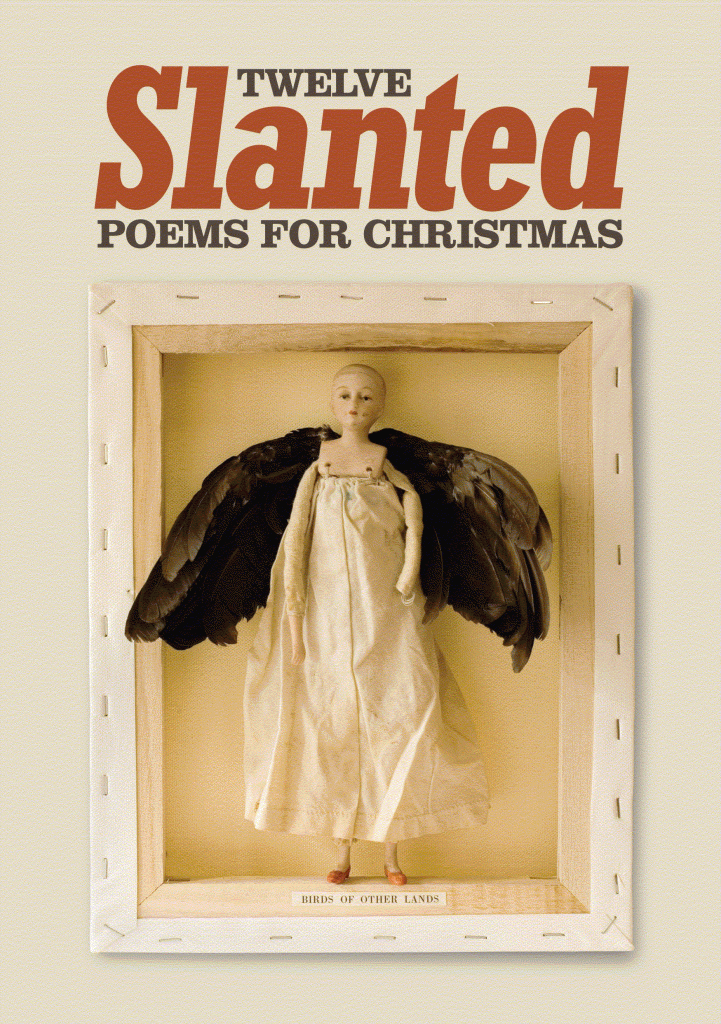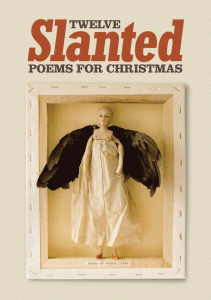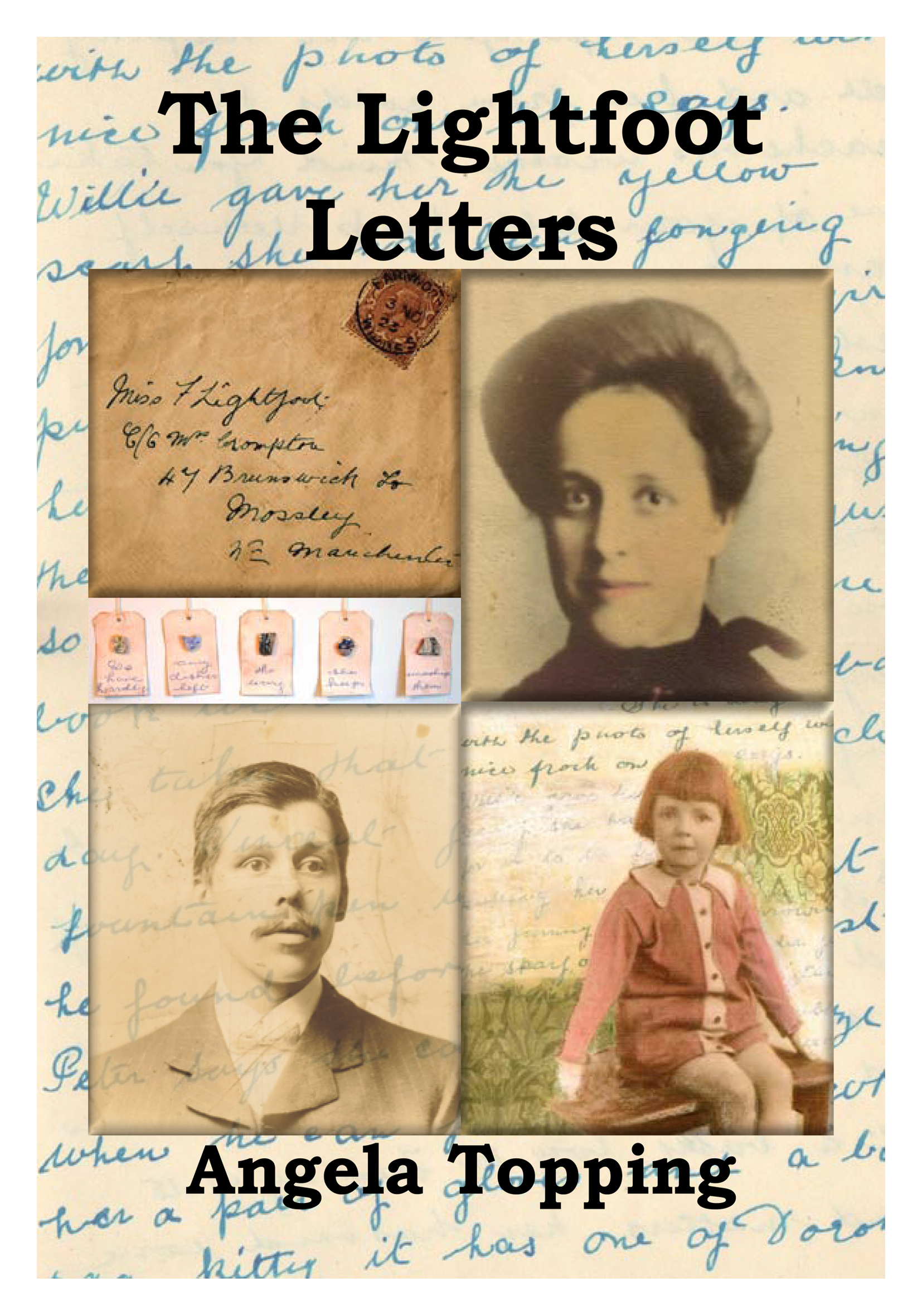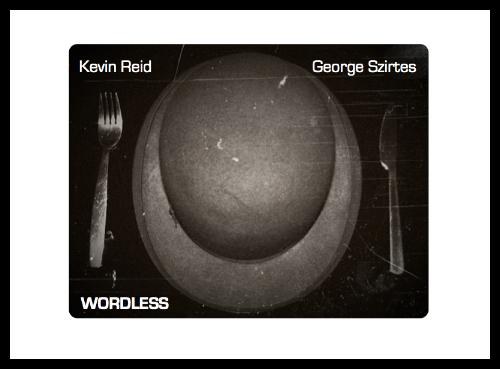Twelve Slanted Poems for Christmas (ed. by Helen Ivory and Kate Birch)
-Reviewed by Angela Topping–
Twelved Slanted Poems for Christmas is the very first publication by the popular webzine, Ink Sweat and Tears, who annually run a feature called The Twelve Days of Christmas, which include poems about the festive season which are a little bit darker than usual. Editor Helen Ivory’s own poems are often surreal narratives which express ideas through quirky metaphors. With these antecedents, the reader expects something unusual and off kilter than, say, Candlestick Press’ lovely poems about Christmas selected and introduced by Carol Ann Duffy. This Ink Sweat and Tears pamphlet sits alongside these but provides a refreshing counterpoint.
The appearance is very distinctive. The cover art is one of Ivory’s assemblages: an angel with crow wings titled ‘Birds of Other Lands’. Characteristically, it is both disturbing and oddly beautiful, and a good indication of what might lie inside the covers. The end papers have a subtle holly pattern reminiscent of William Morris, but in burnt orange. The pattern reminds me of faded, nicotine-stained wallpaper from the council houses of my youth. (Ours was decorated with much more garish wallpaper though!). The card covers are very sturdy and the pages are heavy cream paper.
One of the themes is family relationships. Bobby Parker’s ‘Factory Spirit’ centres on a father, who has been made redundant from a factory job and has no hope of finding another. This was a common experience for a whole generation of men. He’s a man with memories of privations survived, but who now feels useless:
‘How he desperately longs to see the factory spirit,
to know there’s something else before
they lay him off again.’
It’s a sad poem. It is also a very loving one, but the speaker finds it hard to communicate with the father, and it’s important not to ‘make him angry’ by speaking in a language he doesn’t understand. A poignant motif is the silver cigarette lighter which the father keeps tapping on the table, but it turns out to be broken. Talking about love directly is impossible but it’s there between the lines of everything the speaker says. The links with Christmas are the robin on the fence, and the clouds compared to ‘Christmas ghosts’, however these details do feel relevant to the poem and not just included to fulfil the brief.
Julia Webb’s poem ‘Broken’ speaks of another father, one who is having some kind of breakdown, perhaps. He breaks all the glass in the house before putting his head down in despair on the kitchen table. The fragility of glass makes it s good symbol for the fragility of love, and the last line is a killer: ‘The room glittered around him’. Clever editing places this across from a feel-good poem, ‘Watch’ by Luke Wright, who is opening presents with his son, taking over his own father’s role. Feel-good, that is, until the brilliant sting of the last line with its carpe diem imperative; unwrapping a watch, his son says: ‘Wow, Dad, it’s going really fast. The title’s pun is now evident. Something of an achievement to get a turn like this in three couplets! Carrie Etter’s poem also fits in this theme, giving the reader another one of those defining Christmas moments when myths melt under the weight of reality.
Another thread of the pamphlet is the taking and reinventing of Christmas clichés. Moniza Alvi’s ‘Angels’ are the care home nurses, who present angelic faces to their patients despite having their own problems. In the hands of a lesser poet, this could be sentimental but Alvi sidesteps that by keeping the language fresh and straightforward:
‘she has more medicines to issue
than Santa has presents in his sack.’
The wickedly witty W.N. Herbert has a Doctor Who type invasion of green jelly in the high street, extrapolating ‘Mother Goo’ from Mother Goose. This poem is loaded with hyperbolic language for comic effect, so the reader relishes the words as they are spread out in front of them like a map of the jelly’s progress. There have been quite a few pieces written about the ‘Twelve Days of Christmas’, but George Szirtes makes it new with a hilarious sonnet, ‘The Norwich Version’ in which everything has gone sour:
‘After the dancing ladies and the ever leaping lords
Christmas ran out of music, lost its melodies and chords,’
however, harmony is restored at the end, albeit an uneasy one.
In ‘Masterchristmas’, Ira Lightman uses the idea of cookery programmes to package Christmas in terms of the glossy anti-reality which appears on TV. The point is, we want it to be true, we want it to be that way. We are suckered in by it. Under Lightman’s playfulness is a deadly truth. The poem plays with repetition: stanza four and seven are the same, expressing the hopelessness of the situation, as well as the seductiveness of it.
Tim Turnbull and Andrea Holland take two Christmas tropes and veer away from them. Turnbull’s poem ‘Room at the Inn’ critiques modern society and its lack of social conscience while Holland’s ’Spent’ unpicks the way we prepare for Christmas, with ‘ragged tunes’, ‘green but cruel holly’, ‘tinsel’s/ tatty smile’ and concludes with the price we pay for our seasonal idyll: ‘The fruit we eat has come a long way’
Bethany W. Pope and Penelope Shuttle focus on the weather. Pope’s poem, ‘In the Bleak Midwinter’ is about living in a tree and reflects with originality and unsentimental language, what it is like to be homeless when it is very cold. The speaker establishes a home in a graveyard yew, making a fire from moss and sucking an icicle for drink. The resurrection seems more appropriate than Christmas, as the speaker longs for a change. Penelope Shuttle’s ‘Winter’ is similarly bleak:
‘A comet lashes
its fiery tail
too far away
to warm us.’
The short lines create a pinched impression and accentuate the recessional cold.
Slanted is by no means cheerless, but it is thought-provoking. It’s probably not the gift to buy for anyone who likes saccharine sentiment, but if you know someone who appreciates contemporary poetry and likes to be challenged and stimulated, you couldn’t do better for them than to slip this under the tree with a ribbon round it.






Great review, though I feel compelled to comment that ‘Spent’ is meant to be less about preparing for Christmas than the facade of ‘seasonal cheer’ (cheap decorations, expensive tat) & that ‘getting and spending we lay waste our powers’!